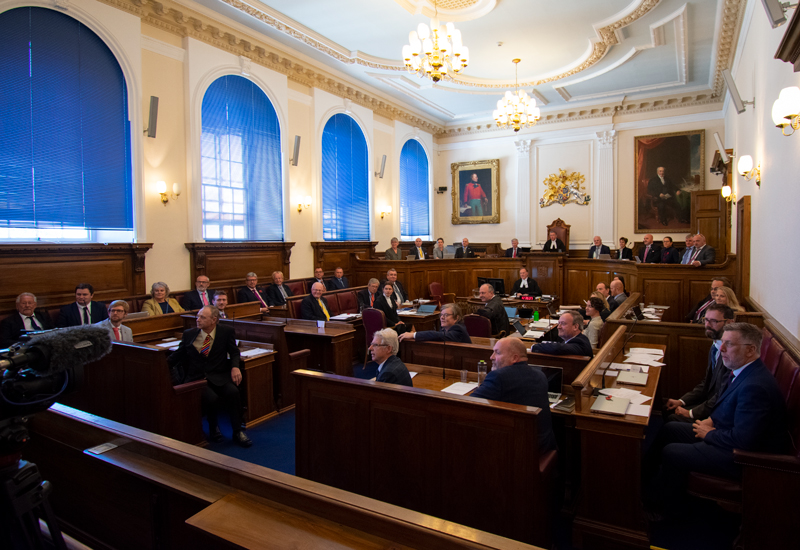


The 2024 States of Guernsey Budget has been approved and Deputy Gavin St Pier has provided his take on a complex and split debate.
You can read his full update below:
It took a while, but the 2024 States of Guernsey Budget finally got approval after five days of debate, split over two sittings. The Budget itself was pretty uncontroversial, aside from the 17% (average) increase in TRP of which most householders will probably be unaware, at least until their 2024 TRP bill thumps on the doormat. Certainly, those who are earmarked for a 40% increase will feel the pain when that envelope is ripped open.
Of course, most of the Budget debate wasn’t about the Budget at all. It was about attempting to re-open October’s Funding & Investment Plan (FIP) debate to fund the defunded Transforming Education Programme (TEP), in particular the capital project part of TEP building a campus at Les Ozouets for all post-16 education. Despite the suggestion following the FIP debate, States’ Members didn’t know what they were voting for on the FIP, they went on repeatedly to re-affirm that decision. There can be no ambiguity now after multiple votes and many days of debate that the States does not want the Ozouets project to proceed, so long as it appears there is no sustainable funding to pay for it.
The ball is now firmly back with the Committee for Education, Sport & Culture (ESC) and the Policy & Resources Committee (P&R) to return with a ‘Plan B.’ Like David Cameron during the Brexit Referendum, mistakenly, it seems that ESC refused to countenance the need to prepare a Plan B. They either could not or would not concede that there could be any other outcome than Plan A, perhaps like Cameron, fearing that to do so would give credibility to an outcome they did not want. Whilst that shows admirable commitment to their chosen policy path, it was politically naïve or foolhardy – particularly after the FIP debate – to fail to prepare an alternative.
If ESC were overly rigid, P&R’s movements displayed more inconsistency than flexibility. Going into the FIP, their advice to the States was very clear that the scenario that envisaged building at the Ozouets without their GST package having been approved, was unsustainable and unaffordable in the long run. Nothing had changed between the FIP debate and the Budget but now P&R were rowing in behind doing just this. The explanation given was simple: that the project was needed, and it would just have to be the next Assembly’s problem to work out how to pay for it. Some saw this as a decision that would lay a trap for the next States who would have no choice but to go down the GST path. Others saw the risks of the decision simply ensuring that a new, populist group of Deputies would be elected in 2025 on a no-GST-over-my-dead-body ticket, sweeping aside those who had voted in favour of GST (which includes a fair few elected in 2020 on a no-GST-over-my-dead-body ticket.) P&R’s failure to provide a consistent and coherent position undoubtedly will have damaged them further going into the Motion of No Confidence (MONC) debate, particularly when added to their costly vacillation on borrowing and constantly changing narrative on the tax debate (with the need for GST apparently being driven by ageing demographics in February and the capital programme in October.)

The MONC is proving as ill-tempered and fractious as they always are. If one group are saying they have no confidence in another, and the latter refuse to resign, it’s never going to be a cordial and relaxed debate. The resignations of Deputies Mahoney and Helyar at the beginning of the debate may have been intended to shift its dynamic, by opening up the possibility that P&R could be rejuvenated for its final 18 months with a couple of fresh (or not so fresh) faces replacing them. If that was the intent, the absence of any clear explanation from those resigning or any response from those not resigning would not have helped. If it was a strategy, it lacked any narrative.
The case for the prosecution is multi-faceted with a number of issues cited. Some were specific, such as the handling of the tax debate, the £8m cost of inactivity on the inert waste solution, the debacle on the harbours debate or the absence of expenditure restraint this term. Others were more general, referring to the lack of leadership, bullying or other poor behaviours. There hasn’t been a rebuttal point-by-point, rather the case for the defence, so far, has been much simpler and more generic, namely that any failures this term are failures of the whole States and all States members, not just P&R. In the end, the MONC was talked out, at least until the beginning of the next meeting, in part by an hour long speech from the President of P&R which sounded very much like a filibuster, given that to most listening, by way of example, his grandfather’s birth in 1872 didn’t have much apparent link to whether or not the States should have confidence in P&R in 2023. When challenged, the Presiding Officer said he was tolerating departures from the relevance of the motion with an explanation that the President was responding to the motion on behalf of the committee, even though there is no such rider in the rules.
Given the MONC was lodged at the beginning of November and will not now be determined until mid-December, it has to be assumed that far from wanting to lance the boil, P&R were hoping, as sometimes happens, that the heat and energy of the motion would leach away with time. If so, it seems to have been a miscalculation. The failure to respond appropriately to a motion that could have been avoided by effective leadership, is itself now contributing the momentum in favour of the motion. The repeated delays in getting to the debate accompanied by the resignations of some, leaves an impression that the others are clinging on, which plays into the hands of those arguing a completely clean slate is needed. Demonstrating political experience, Deputy Parkinson, who first floated the idea of a MONC after the first tax debate in February before making his move in November, has serenely played a long game. Whatever the outcome, he has already secured change in the composition of P&R, but when he sums up the debate at its conclusion in mid-December, he will have the final opportunity to persuade the States to press ‘reset’ for its final 18 months.